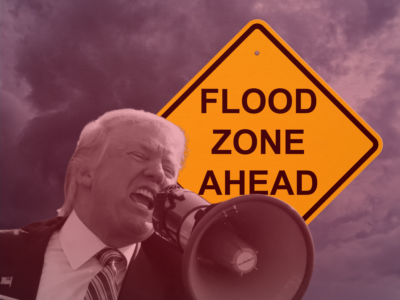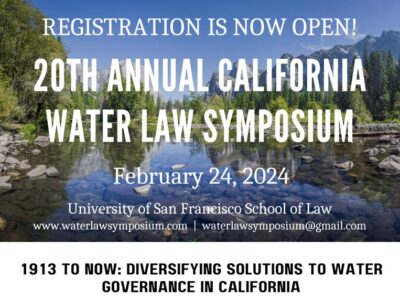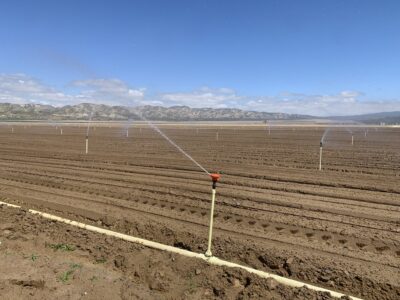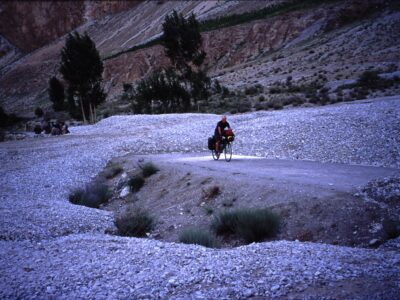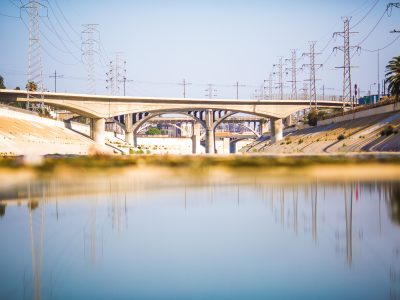Water
Executive Disorders
One after another, Trump has let loose destructive blasts at the environment to promote fossil fuels, mining, and logging.
We all know that Trump has issued a slew of executive orders since taking the oath of office. We also know that many of these are aimed to promoting fossil fuels, mining, and logging at the expense of the environment, while disfavoring renewable energy. Still, it’s impressive when you put the list together to see the full onslaught.
CONTINUE READINGA Disinformation Deluge on California Policies
Trump and House Republicans are trying to ‘flood the zone’ when it comes to wrongly blaming California environmental regulations for the LA fires.
Trump’s longtime strategy of ‘flooding the zone” — aka overwhelming opponents with a flurry of announcements and superficial initiatives — took a literal turn last week, when his administration ordered the release of a significant amount of water from two dams in the Central Valley to try to score political points. As the New York …
Continue reading “A Disinformation Deluge on California Policies”
CONTINUE READINGCalifornia Water Law Symposium is this Saturday in San Francisco
This student-organized event will focus on “Diversifying Solutions to Water Governance in California”
If you’re interested in California water, the 20th Annual California Water Law Symposium is a great way to spend this Saturday! The symposium is a collaborative student-run event that consistently brings together leading minds in water law and policy to discuss California’s critical water issues. Students from 7 northern California law schools—led by a stellar …
Continue reading “California Water Law Symposium is this Saturday in San Francisco”
CONTINUE READINGOne More Key Groundwater Bill Just Became Law
Gov. Newsom signs AB 779, which addresses inequities in California’s complicated groundwater adjudication process.
Earlier this week the San Francisco Chronicle declared that California’s legislative session would close with just a single bill addressing injustices in the state’s water rights system. Now you can add one more to the list. Gov. Newsom signed Assembly Bill 779 into law this week. It’s an important step to reforming the state’s murky—often …
Continue reading “One More Key Groundwater Bill Just Became Law”
CONTINUE READINGCan we make a map for wastewater innovation?
…or even a guidebook?
During one phase of my misspent youth, I travelled by bicycle in search of adventure and insight. (Hang with me, this relates to environmental management, and I’ll get to that soon.) On one tour, I started in Vietnam, ending up in Pakistan a couple years later, having made some detours and added other means of …
Continue reading “Can we make a map for wastewater innovation?”
CONTINUE READINGUCLA Clinic Submits Amicus Brief in Water Rate Design Case
A trial court decision invalidated the City of San Diego’s tiered water rates. This amicus brief by the Environmental Law Clinic on behalf of California Coastkeeper Alliance and Los Angeles Waterkeeper argues a reversal is needed to pursue conservation and equity.
Court challenges to the use of tiered water rates in California are threatening the state’s own water conservation and affordability goals. That’s what’s at stake in a case called Patz v. City of San Diego. Climate change is intensifying California’s hydrologic variability and exacerbating the state’s water supply challenges. Dwindling water supplies have led …
Continue reading “UCLA Clinic Submits Amicus Brief in Water Rate Design Case”
CONTINUE READINGA decade of unraveling the effects of regulation on water innovation
By Michael Kiparsky, with Dave Smith, Nell Green Nylen, Luke Sherman, Alida Cantor, Anita Milman, Felicia Marcus, David Sedlak, Bernhard Truffer, Christian Binz, Sasha Harris-Lovett, Jeff Lape, Justin Mattingly, Dave Owen, Lars Tummers, Buzz Thompson
In a recent post, my colleagues and I reported on our most recent research output in a long series of projects examining the effect of regulation on water innovation. The post describes a new framework for understanding and, ultimately, improving relationships between regulators and wastewater utility managers who are seeking to implement novel technical solutions, …
Continue reading “A decade of unraveling the effects of regulation on water innovation “
CONTINUE READINGThe Ongoing Tension over Stormwater Discharges in Los Angeles
Upcoming hearings on a proposed new MS4 permit will set the stage for the future of water quality throughout LA County
[Disclosure: The Frank G. Wells Environmental Clinic at UCLA School of Law is representing Los Angeles Waterkeeper on matters related to the subject of this post. I will shortly be joining Los Angeles Waterkeeper as a Staff Attorney. However, like all other Legal Planet posts, this post reflects only my own views and opinions.] The …
Continue reading “The Ongoing Tension over Stormwater Discharges in Los Angeles”
CONTINUE READINGHow can California make water data work for decision makers?
by Alida Cantor and Michael Kiparsky
California produces immense amounts of water-related data. Yet, California also struggles to adapt its water systems to pressures such as climate change and population growth. To meet these challenges in an informed way, decision makers need data that supports their needs. In 2018, spurred by the Open and Transparent Water Data Act of 2016 (AB …
Continue reading “How can California make water data work for decision makers?”
CONTINUE READINGTime to Get Serious about Climate Change and Oceans
Science can unlock powerful tools to fight climate change and ocean acidification, but only if we fund research and govern it well.
In the Before Time, I spoke with a few ocean scientists on climate issues, and I heard a common refrain. Climate change receives little attention or funding, considering the magnitude of the problem; climate impacts on oceans get even less; and marine carbon removal gets almost none at all. Humans are short-lived terrestrial creatures. …
Continue reading “Time to Get Serious about Climate Change and Oceans”
CONTINUE READING




